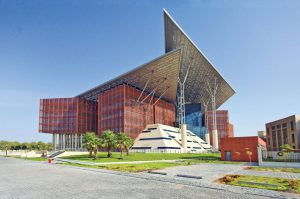ABU DHABI / WAM
The Abu Dhabi Judicial Department (ADJD) organised the First Abu Dhabi International Forum on Legal Frameworks for a Sustainable Future in Green Tourism, Therapeutic Tourism, and Climate Change.
The forum aimed to discuss guidelines, regulations, and legislations to promote and support sustainable tourism in green and therapeutic tourism, as well as climate change.
The event was a collaboration between the Abu Dhabi Judicial Department, the Environment Agency — Abu Dhabi, the Abu Dhabi Department of Culture and Tourism (DCT), and the Department of Health — Abu Dhabi. It was part of the UAE’s strategic efforts for the Year of Sustainability 2023 and the preparations for hosting the 28th Conference of the Parties to the United Nations Framework Convention on Climate Change (COP28) following the directives of His Highness Sheikh Mansour bin Zayed Al Nahyan, Vice President, Deputy Prime Minister, Minister of the Presidential Court and Chairman of Abu Dhabi Judicial Department, to establish a pioneering legal and judicial system.
The forum, conducted remotely over two days through the Abu Dhabi Judicial Academy (ADJA) platform, featured distinguished speakers, consultants, and experts who discussed experiences, initiatives, legal systems, and relevant legislation related to sustainable futures in therapeutic and green tourism and climate change.
Saeed Obaid Al Fazari, Executive Director of the Strategy Sector at the DCT, emphasised the importance of collaboration between government and private agencies in promoting sustainable development in Abu Dhabi. He highlighted the DCT’s sustainability initiatives and its aim to include all tourism facilities in the emirate.
Dr Ahmed Abdelzaher, Legal Consultant at the Technical Office of the Undersecretary of ADJD, discussed legislation related to green tourism that considers environmental requirements and methods for preservation and protection. He also suggested the introduction of tax incentives to encourage tourist establishments to adopt environmentally sustainable standards.
Judge Oran Whiting, from the Foreign Experts Chamber of Abu Dhabi Commercial Court, discussed the concepts and classification criteria of ecotourism. He provided international examples and outlined the different legislations enacted in this regard.
Dr Heidi Issa Hassan, a lecturer at the Department of Private International Law, Faculty of Law, Cairo University, emphasised the importance of green tourism law in promoting tourism and achieving sustainable development. She highlighted the role of the law in control, auditing, and training based on international best practices.
Judge Fahad Al Tameemi, from Abu Dhabi Commercial Court, praised the UAE’s proactive measures in climate change and green investment. He shed light on national legislation and international sustainability and green tourism agreements.
Sheikha Al Mazrouei, Executive Director of the Integrated Environment Policy and Planning at EAD, presented the agency’s experience in protecting the environment amidst climate change in a paper titled “Enjoy Green Abu Dhabi and Natural Reserves.â€
Ahmed Abdullah Al Dhaheri, Head of the Terrestrial Protected Areas Unit at the Environment Agency, discussed incentives and experiences for successful ecotourism initiatives in natural reserves. He highlighted activities suitable for the wild environment in Abu Dhabi and terrestrial protected areas that can support ecotourism development.
Dr Mohamed Hashem, an expert in international law and former advisor to the Egyptian Council of State, provided insights on global models of ecotourism and climate change. He outlined the legal framework at international and national levels, suggesting adopting international legislation to contribute to sustainable development in the sector.
The forum brought together experts to explore ways to advance sustainable tourism practices and address climate change challenges.
 The Gulf Time Newspaper One of the finest business newspapers in the UAE brought to you by our professional writers and editors.
The Gulf Time Newspaper One of the finest business newspapers in the UAE brought to you by our professional writers and editors.
